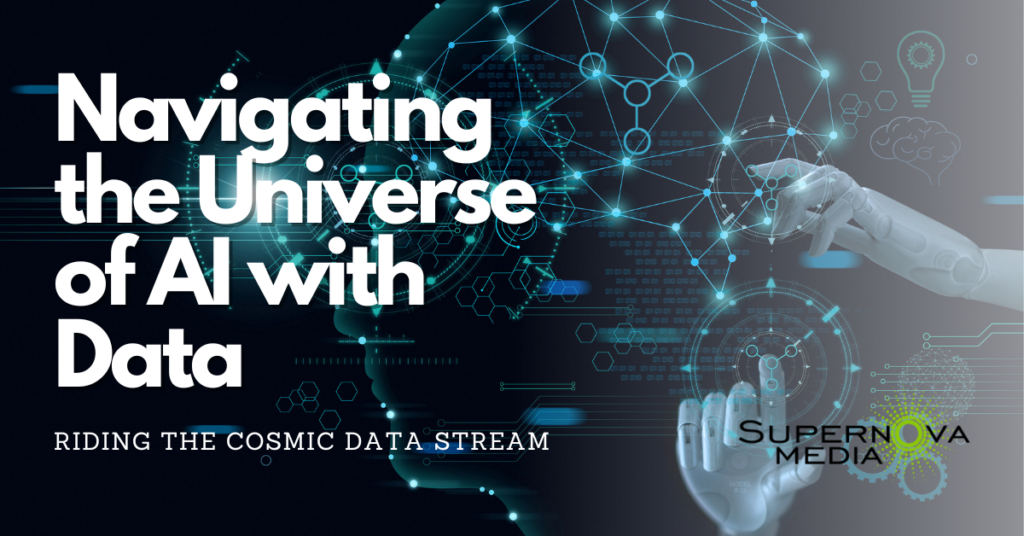
Greetings, fellow cosmic travelers! Welcome to our astral journey through the expansive cosmos of artificial intelligence (AI) and data. Much like the galactic constellations guiding interstellar voyages, data steers the ship of AI, providing illumination on the path to intelligent solutions.
The Dawn of AI: Data, the Rising Sun
AI’s birth can be traced back to the “Big Bang” of data. Every photon of information collected sparks an instance of AI’s understanding. The same way the Sun nourishes life on Earth, data fuels AI, setting in motion an enlightening experience. Without data, AI would be like Pluto—cold, dark, and distant.
The amount of data we generate has skyrocketed, much like the path of a comet, especially in the last decade. By using data, we can make AI models learn to understand, reason, and react, similar to human intelligence. Data, indeed, breathes life into the otherwise dormant martian soil of AI.
Starting at the Space Station: Where to Begin?
Before launching your spacecraft, you need to understand the type of data you’ll encounter in your AI odyssey. Data is the Milky Way’s fabric—intertwined and infinite. There’s structured data, like neatly aligned celestial bodies—easily identifiable and measurable. Unstructured data is more like a nebula — unpredictable, yet filled with valuable resources. Both have unique roles in AI.
For AI to grasp human language, we introduce it to countless text documents—books, articles, social media feeds, like the pages of the universe’s grand novel. For image recognition, we expose it to a vast collection of images, allowing it to capture and understand visual cues, like witnessing an array of stars scattered across the vast cosmic canvas.
Best Practices: Your Astral Navigator
Navigating the astral sea of data requires precise handling. Remember, not all data is like the friendly constellations we often gaze at. Here are a few best practices for you to follow:
- Data Quality: Ensure your data is like a clear night sky—pristine and without misleading artifacts. Quality data leads to accurate results, reducing the chances of landing your AI on the wrong planet.
- Data Diversity: Ensure your data set is diverse, resembling the eclectic universe. A dataset full of similar data points is like a nebula with only one type of gas—limiting the variety of stars it can form.
- Data Privacy: Be respectful of personal data. Handle it like a sensitive celestial object. Employ methods like anonymization and encryption to ensure the privacy of individuals.
A Galactic Dance: How AI Leverages Data for Machine Learning
Think of machine learning (ML), a subset of AI, as a celestial dance, where data and algorithms twirl in an intricate waltz. The dance begins with a training phase where the ML model is exposed to a labeled dataset. It’s as if we are showing the model a constellation map, pointing out various celestial bodies and their names.
In the testing phase, the model is introduced to new data. Now, it must identify the celestial bodies on its own, much like recognizing constellations without the guiding map. This iterative process enables the model to make more accurate predictions over time, akin to a fledgling astronaut growing into a seasoned cosmic voyager.
The ML model’s successful evolution from a learner to a predictor is a testament to data’s potent influence. Data is the compass guiding the AI spacecraft towards a future where ML models act as co-pilots, assisting us in steering our collective cosmic ship into unexplored territories of possibility.
So, as we propel further into the AI cosmos, remember the power of data, the celestial body that lights our way. Harness it wisely and let your journey be full of stellar discoveries. After all, as Carl Sagan once said, “We are all made of starstuff,” and perhaps, so is AI.
This blog post is just a brief interstellar hop into the vast universe of AI and data. Keep your telescopes directed towards Supernova Media for more exciting cosmic explorations! Until then, happy data gathering, fellow stargazers!














